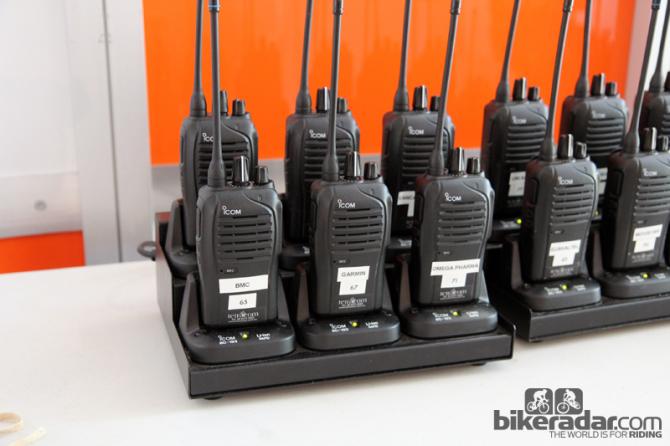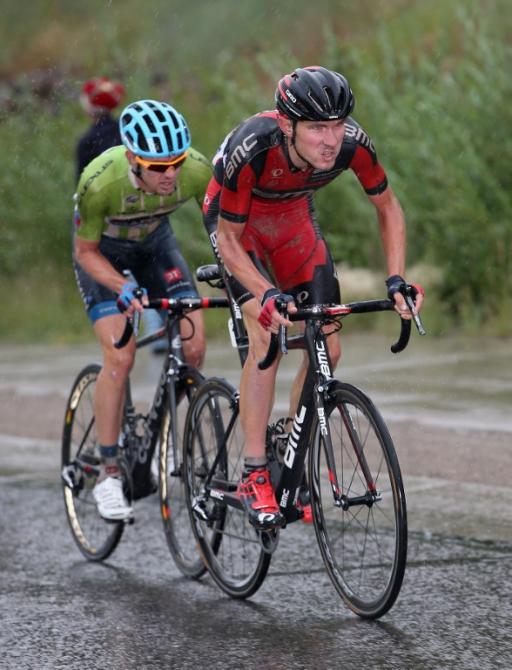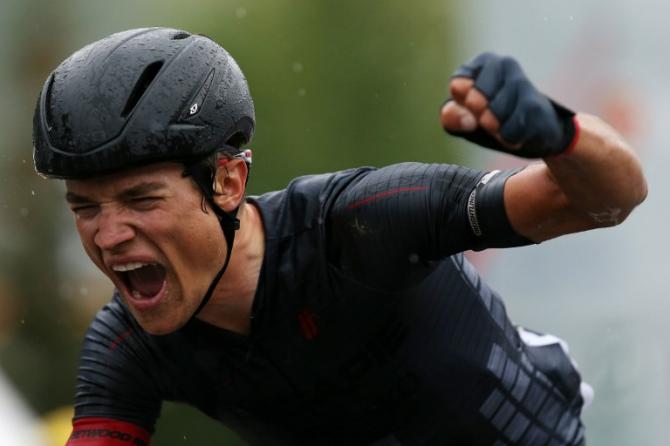Riders call into question lack of radios at non-WorldTour events
Inability to communicate neutralisation causes confusion



A rainy day and a muddy, gravel descent Tuesday at the USA Pro Challenge in Colorado called into question, once again, the UCI's decision to ban race radios from all non-WorldTour events.
The inclement weather began as the race neared the top of the day's penultimate climb, the category 2 gravel ascent of Kebler Pass. It continued to pick up as riders descended off the climb on what quickly turned into a muddy, wet road leading toward the finish at Mt. Crested Butte. Officials decided to neutralize the dangerous descent, but lacking the ability to communicate that decision to the riders, confusion reigned.
"I saw the motorcycle of the organization that wanted to neutralize the stage," said BMC rider Ben Hermans. "But they couldn't go to the front of the group, so only in the back of the group we knew that they wanted to neutralize, and in the front they didn't know."
The front of the race continued to go full gas down the descent, chasing solo breakaway rider Robin Carpenter of Hincapie Sportswear. When the road turned back into pavement, the Mavic support moto was able to get in front of the field and bring the race to a halt.
"By then the dangerous part was over," Hermans said. "So it was a little bit ridiculous. Then we got cold and nobody wanted to start the race again. But this guy was one minute in the front and we had to chase him. We worked all day for this, and it was little bit stupid to just let him win the stage. We wanted the stage win for Tejay [van Garderen]."
Van Garderen, like the majority of the riders in Tuesday's stage, believed the officials made a mistake in neutralizing the race in the first place, and then the mistake was compounded by the lack of ability to communicate the decision to the riders.
"Here's an idea," van Garderen wrote on Twitter. "Bring back the radios in non-world tour events."
The latest race content, interviews, features, reviews and expert buying guides, direct to your inbox!
Trek Factory Racing's Matthew Busche was on the same page as van Garderen.
"I don’t think the riders had any idea that there was a neutralization supposedly from the top through the dirt descent," Busche said. "When we came back onto the pavement with only 9km to go, the dangerous part was over, but they still stopped us. There was a little protest from the field – the guys were shaking and shivering, and close to hypothermia – it was a pretty good circus today. Today is a good example of where radios would be nice and beneficial. They want to neutralize for safety, and I understand that, but I am not sure it was the best choice today. It was special circumstances for sure."
BMC's Peter Stetina also chimed in on the subject.
"Hey @AIGCP @cpacycling," Stetina wrote on Twitter. "CO stage today shows how radios/foul weather protocol are needed for safety. Here is an on-site example. #accountable."
Race director Jim Birrell said the situation created a perfect storm that could have been made better if officials and team directors were better able to communicate such decisions to riders.
"There were all the ingredients why if these riders were able to race with race radios then that message wold have been heard," he said. "I wouldn't suggest or say there would have been a different outcome, but the whole entire peloton would have been informed that the decision was made based on the safety of the racers."
The situation Tuesday in Colorado was not unlike the stage in this year's Giro d'Italia when organizers tried to neutralize a descent, but the race blew right past the red flags that moto drivers were using in an attempt to slow the riders. Race radios didn't help that day.
Alex Howes, who finished second on the day and took over the race lead, said the lack of communication and the decision to neutralize the race at the bottom of the descent actually put riders in greater danger.
"There was some confusion there with the neutralization," he said in the post-race press conference. "We went through the nasty part in the downhill with the mud and everything. It seemed like all the bad stuff was behind us, and then there were a bunch of people standing there in the road."
Team SmartStop director Michael Creed said that if officials are going to make a call to neutralize, they need a way to enforce it and make it happen.
"Did the riders call it? Did the directors call it? It came over the race radio: be advised at the top of the climb we're going to neutralize it. That's fair enough, but you have to have the guts to pull your car across the road and say, 'This is what's going to happen.' You have to say that, you have to own the decision."
Growing up in Missoula, Montana, Pat competed in his first bike race in 1985 at Flathead Lake. He studied English and journalism at the University of Oregon and has covered North American cycling extensively since 2009, as well as racing and teams in Europe and South America. Pat currently lives in the US outside of Portland, Oregon, with his imaginary dog Rusty.